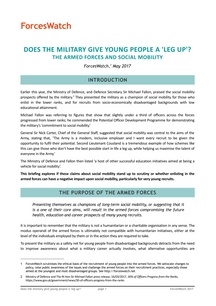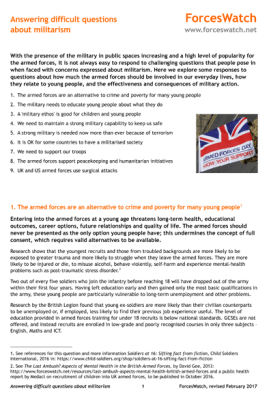Found 434 Results
Page 15 of 31
What would Lennon do on Liverpool’s Armed Forces Day?
21/06/2017

“Peace is possible, and it isn’t just inevitable to have violence… so advertise yourself that you’re for peace if you believe in it.” Imagine John Lennon alive today, with a ticket to ride back to his hometown, Liverpool, on 24 June 2017, the day that the city hosts Armed Forces Day.
Let’s Give Peace a Chance on Armed Forces Day
12/06/2017

Armed Forces Day is on Saturday 24 June, or 17 June in some places. Over 350 events which package war as entertainment with military vehicles, weapons and recruiting stalls will be taking place across the UK. The national event is taking place in Liverpool. Here we list alternative events that are challenging the militarism of Armed Forces Day with vigils and events promoting peace.
#GE2017: info & questions for candidates
26/05/2017
A brief roundup of manifesto pledges on defence and security and some questions for your candidates on their support for a more sustainable and ethical security policy, one that does not result in the promotion of military intervention or military interests within education and civil society.
Does the military give young people a ‘leg up’? The armed forces and social mobility
25/05/2017

This briefing explores if these claims about social mobility stand up to scrutiny or whether enlisting in the armed forces can have a negative impact upon social mobility, particularly for very young recruits.
Armed forces visits to Scottish schools – a ‘big issue’
07/03/2017
Our petition lodged at Holyrood along with Quakers in Scotland on military visits to schools has taken a significant step forward.
Military recruitment of under-18s debated in Westminster
24/02/2017
We report on the recent debate in Parliament arguing that the age of recruitment to the UK armed forces be raised.
Answering difficult questions about militarism
21/02/2017

With the presence of the military in public spaces increasing and a high level of popularity for the armed forces, it is not always easy to respond to challenging questions that people pose in when faced with concerns expressed about militarism. In this briefing we explore some responses to questions about how much the armed forces should be involved in our everyday lives, how they relate to young people, and the effectiveness and consequences of military action.
Science for Society
24/01/2017

Science4Society Week is a collection of science education activities, co-ordinated by Scientists for Global Responsibility, and designed to inspire young people. It takes place in March each year.
Army life: the other side of the story
17/01/2017

Telling adolescents that they can resolve their need to belong by joining the Army is simplistic and one-sided. The reality is many aspects of army life are potentially harmful, especially to vulnerable individuals. The other side of the story needs to be told. This is a longer version of an article first published by The Huffington Post
Petition FAQs
21/12/2016
The petition calls on the Scottish Parliament to urge the Scottish Government to ensure that:
- Guidance is provided on how visits to schools by the armed forces should be conducted so that information presented to children takes account of the unique nature of armed forces careers, ensures political balance, and offers a realistic representation of the role of the armed forces and what a career in the armed forces involves.
- Information is collected to enable public monitoring of the number and location of visits, the purpose and content of visits, and comparison with the number of visits by other employers.
- Parents/guardians are consulted as to whether they are happy for their child to take part in armed forces activities at school.
Why is the petition asking for this?
Teaching Remembrance: focusing on ‘why?’
09/12/2016
A history teacher from Coventry got in touch with ForcesWatch to share her experience of teaching Remembrance to year nine classes this year after reading the resource Rethinking Remembrance in Schools: ‘Teaching about Remembrance this year was a vastly different experience for me than previous years’.
Scottish petition makes headway
30/11/2016
Members of the Scottish Parliament have agreed to seek further evidence on our joint petition – with Quakers in Scotland – calling for greater scrutiny and guidance around military visits to schools.
The British Legion wants us to ‘Rethink Remembrance’ but they are not the only ones
11/11/2016
The Royal British Legion is asking the public to ‘Rethink Remembrance’. Can we remember without obscuring the realities of war and overlaying this important act with militarism?
Quakers in Britain
04/11/2016

The Quakers work on peace education, as well as other peace issues – carrying it out in schools and promoting it as a necessary part of the curriculum.
See here for current Quaker projects, peace education resources and their partner organisations.
Page 15 of 31
